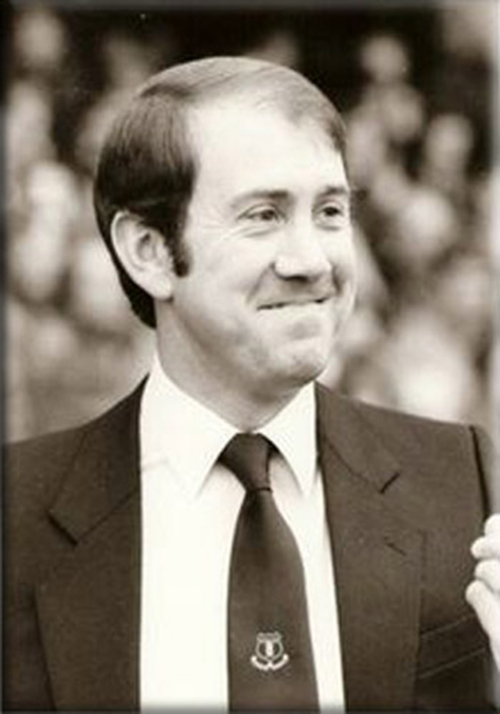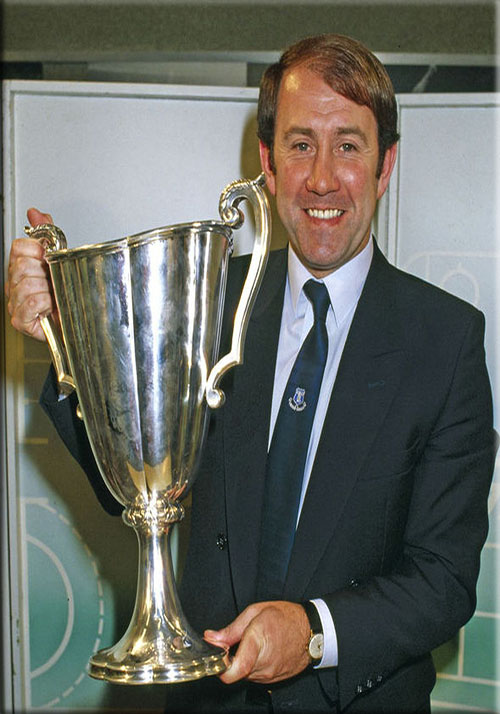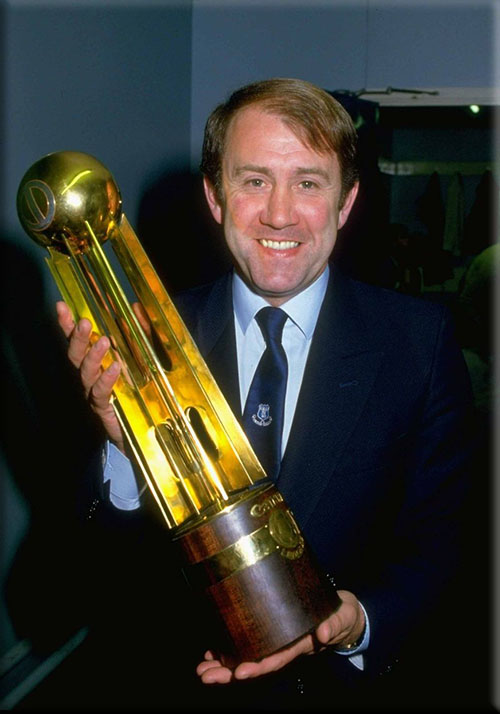


Howard Kendall - Everton Manager : 1981-1987
Former Everton player Howard Kendall returned to the club as manager for the 1981–82 season, having won promotion from the Third Division with Blackburn Rovers and taken them within a whisker of a second successive promotion.
Kendall's reign got off to a promising start with a 3–1 win over Birmingham City on the opening day of the season, and they finished eighth in the First Division. Their steady progress continued into 1982–83, as they finished seventh and only narrowly missed out on a UEFA Cup place. The only real letdown that season was a 0–5 home defeat by Liverpool on 6 November 1982.
During the first three seasons after his appointment as Everton manager, Kendall brought through younger players like Neville Southall, Gary Stevens, Derek Mountfield, Peter Reid, Kevin Sheedy and Trevor Steven, with Kevin Ratcliffe and Graeme Sharp already at the club. Other players would be added but the most significant purchase late in 1983 was Andy Gray. Everton hoped to bring in some success having been massively overshadowed since the early 1970s by neighbouring Liverpool.
1983–84 was a trying season in the league, with Everton being in the bottom half of the First Division for much of the season and fans making continued calls for Howard Kendall to be sacked, but a good run of form in the final weeks of the season saw Everton achieve a seventh-place finish once again.
Everton, however, were progressing on two cup fronts. Reaching their second League Cup final, now known as the Milk Cup, the Blues drew 0–0 with Liverpool at Wembley, but eventually lost the replay. The FA Cup though was the silver lining, with Everton winning the final 2–0 against Watford to end a 14-year trophy drought. This was the fourth time Everton had won the Cup.
1984–85
The following season was to be one of Everton's finest. Despite a less than convincing start, this young Everton team began to flourish.
Everton won their eighth league title with four matches to spare. Once again though, Everton were progressing on two cup fronts. In Europe, Everton reached their first European final after defeating German giants Bayern Munich 3–1 at Goodison, in the European Cup Winners' Cup, after the first leg ended 0–0. The match is regarded as one of the most memorable in the club's history. The final against Rapid Vienna was also won 3–1, as Everton clinched their first-ever European trophy.
In the FA Cup, Everton reached their second successive FA Cup Final. Having already won the league, and having just won the Cup Winners Cup three days earlier, Everton set their minds on a treble. At Wembley, in the final, a tired Everton lost 1–0 to Manchester United. Had they not lost, Everton would have joined Liverpool as only the second English team to win three major trophies in one season.
The 1984–85 Cup Winners' Cup campaign was not without its controversy. In a tie with Fortuna Sittard of the Netherlands, an Everton fan streaked on the pitch and was arrested when trying to climb back over the security fencing into the stands. This was one of many high-profile pitch invasions by fans of English clubs at home and abroad around this time.
The Heysel Stadium disaster consequently resulted in English clubs being banned from European Competition by UEFA.
The 1985 close season saw the acquisition of 24-year-old striker Gary Lineker from Leicester City, with Lineker's arrival sparking the controversial departure of the hugely popular Andy Gray, who returned to Aston Villa.
Double runners up
1985–86, even without European action, would be another exciting season for Everton. By the end of September, it looked as though Manchester United would be champions of the First Division after winning the first ten games of the campaign, while Everton were in fifth place and stood 13 points adrift of Manchester United and also had Liverpool, Chelsea and Newcastle United above them.
However, United's excellent form gradually tailed off and Everton went top of the league on 1 February 1986 thanks to a 1–0 win at home to Tottenham Hotspur. After this, Everton looked on course to retain the title for most of the remaining season, although Liverpool and surprise contenders West Ham United kept on Everton's heels for the following months.
However, failure to beat Nottingham Forest followed by a shock 1–0 defeat to Division One newcomers Oxford United on 30 April resulted in Everton being unseated from the top spot by Liverpool, with only three games remaining. Unfortunately, their defence of the title was ended on 3 May 1986 as Liverpool's last league game of the season left the title out of Everton's reach, despite Everton crushing Southampton 6–1 at Goodison Park on the same day.
However, Everton won the race for second place by defeating fellow contenders West Ham 3–1 on the final day of the league season. On 10 May 1986, they took on Liverpool in the first all-Merseyside FA Cup final. A first-half goal by Gary Lineker, his 40th of the season, suggested that the FA Cup would be heading to the blue half of Merseyside, but two goals form Ian Rush and a goal from Craig Johnston saw Liverpool win the trophy to complete the double, while Everton were left with nothing.
Had UEFA decided to lift the ban on English teams in European competitions at the end of that season (though the ban on all clubs was indefinite, it was reviewed at the end of every season), then Everton would have entered the Cup Winners' Cup, but UEFA voted for the ban to continue for at least another season and so there would be no European action for English clubs for the second season running.
The 1986 close season saw Everton sell leading goalscorer Gary Lineker to Barcelona of Spain, and the arrival of defender Dave Watson from Norwich City, while midfielder Adrian Heath switched to the role of Graeme Sharp's strike partner.
Champions again
The 1986–87 campaign began in a familiar fashion, with Everton and Liverpool being firmly among the contenders, though this time there some unlikely other teams also in contention, including Norwich City and Coventry City. By Christmas, Everton were fourth in the league (level with third placed Liverpool) and a point behind second-placed Nottingham Forest, while a resurgent Arsenal were six points ahead of them at the top of the league. However, a 3-1 win over Coventry City on 7 February 1987 sent them to top of the league, and they clinched the league title on 4 May 1987 with a 1-0 win over Norwich City at Carrow Road.
The European ban on English clubs continued, so Everton would not be able to compete in the European Cup in 1987–88. During the 1987 close season, Howard Kendall defected to Spain to become coach of Athletic Bilbao, and was replaced as manager at Everton by his former assistant Colin Harvey.

Honours
- As A Player
- Preston North End
- FA Cup runner-up: 1963–64
- Everton
- Football League First Division champions: 1969–70
- FA Charity Shield winner: 1970
- FA Cup runner-up: 1967–68
- Stoke City
- Football League Second Division third-place promotion: 1978–79
- As A Manager
- Blackburn Rovers
- Football League Third Division runner-up: 1979–80
- Everton
- Football League First Division champions: 1984–85, 1986–87
- FA Cup winner: 1983–84
- FA Charity Shield winner: 1984–85, 1985–86, 1986–87
- European Cup Winners' Cup winner: 1984–85
- Notts County
- Anglo-Italian Cup winner: 1994–95
- Sheffield United
- Football League First Division play-offs runner-up: 1996–97
- Individual
- Stoke City player of the season: 1978
- English Manager Of The Year (2): 1985, 1987
© 2019 Art By Avinalaff - LoveEvertonForum.com


